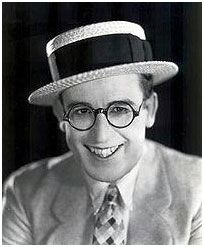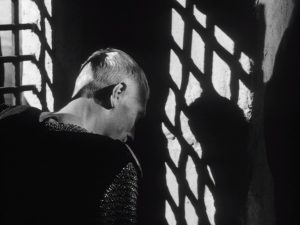
Anyone even slightly familiar with the silent era knows of the staggering amount of films lost to time either through carelessness, accident, or cost-cutting measures. Less discussed are the dozens and dozens of surviving films extant but unavailable for public viewing hoarded by a private collector or locked behind copyright or donor restrictions in an archive. The 1927 comedy Almost Human is one of many such films, just waiting for someone to come around and share it.
I recently had the chance to watch Almost Human here in Los Angeles. On campus at the Powell Library, the UCLA Film and Television Archive provides researchers, students, and interested public viewing stations to watch the films kept in the archive and digitized. I emailed several weeks ahead of time looking for several films produced by Cecil B. DeMille’s independent production company that the archive has copies of. I’m still waiting on copies of the other hardly-seen films Gigolo and For Alimony Only produced by the DeMille Picture Corporation.
After I checked in, the staff inserted a VHS copy of the film and ushered me into a cozy room with a small round table, four chairs, and a medium-sized TV monitor. Unfortunately, the Archive and Research Study Center strictly forbids any pictures, video, or audio recordings; otherwise, I’d be able to bring back plenty of screenshots to spread online. Publicity for the film will have to do for the sake of this review.
Promotional material for Almost Human emphasizes the drama.
I entered my viewing completely blind, knowing nothing about the film except that Cecil and William DeMille produced it. A good enough reason to see a film if you ask me! I was not disappointed. To my pleasant surprise, a title card announced a ‘Cast of Dogs’ billed above the ‘Cast of Humans’. Yes, my friends. Almost Humans is narrated by a dog. (Also according to IMDb, our canine stars Hank, Paul, and Trixie don’t have any other credited roles which I find hard to believe.)
The film fades into a group of a dozen or so dogs of different breeds complaining about humans: Humans sure got their nerve to call dogs dumb! They’re plenty dumb themselves if you ask me! After several dogs make jokes at the expense of humans, whom they don’t call owners but simply mother and father, our protagonist Hank offers to tell his canine friends how he saved his family.
A quickly reproduced (by yours truly) introductory title card using the actual text from the original film.
Hank makes sure to start at the very beginning, telling us how he came into this world. His mother, a street mutt, convinces the pampered Regent Royal to go out on the town with her. I kid you not, one night out and then Hank is born in a barn shortly afterward. I guess censors were okay with canine but not human one-night stands.
Quickly growing up, Hank needs to find a human to take care of to fulfill a dog’s purpose in life. He spends several days walking around town sniffing everyone in sight to find the right fit. It’s not until he meets Mary (Vera Reynolds), a young woman without a penny to her name or a place to stay. Lucky for both of them, Mary meets a sociable rich heir named John (Kenneth Thomson) who instantly finds a liking to her.
John invites her to stay at his mother’s home after they bond over both helping to rescue a young girl from drowning at the lake. Unfortunately, once Hank begins taking care of Mary, the humans take over the focus of the film. Vera Reynolds is a charming protagonist and Kenneth Tomson holds his own as her suitor but the dogs and their humor are really the main appeal of the picture.
You don’t often see publicity still with the star’s head facing away from the camera.
Against his mother’s wishes, John marries Mary instead of a rich family friend who would have propelled John’s career and upper-class social standing. You can imagine the conflict this causes between the couple and how the mother-in-law treats them. The climax features Hank pulling the couple’s baby in a wooden carriage on the streets of Los Angeles. A fun chase with plenty of near misses and great stunts ultimately results in a happy ending for all humans and dogs involved.
Almost Human works as a breezy, programmer running slightly over an hour. Dismissed as light entertainment and quickly forgotten it unfortunately doesn’t have a large footprint. For instance, Variety labeled the film a big disappointment whose only redeeming quality is John Kraft’s titlecards.
Mary might be in doubt but Hank is a good boy who knows what he wants.
The copy of the film itself was not in top shape. As far as I could tell, all the footage survived but the film hasn’t been touched since it was transferred to VHS most likely several decades ago. No score either at first tested my strength but as soon as the dogs showed up it became a rather enjoyable experience.
I hope programmers or independent labels pick it up to restore, screen, and release soon, especially since it officially entered the public domain at the beginning of this year. It’d be a shame if Almost Human stays stuck in the doghouse as it would easily entertain a crowd at a classic film festival like Cinecon. Until then, if you get the chance to visit UCLA for a few hours, Almost Human is well worth the hassle of checking out.






